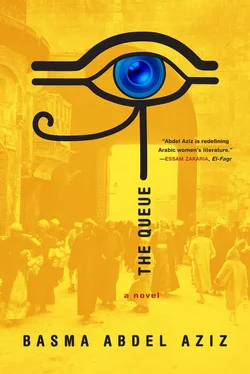The Youth Channel presenter cried too, deeply affected by the events in the square. Her voice blared out of a radio inside a parked microbus, around which people from the queue had gathered. A well-known and respected psychologist was invited onto various news programs to explain and analyze the situation. He assured listeners that there was a very rational explanation for what was happening: the hot weather, which naturally leads to excitability, anger, and uncontrollable behavior. During one of these interviews, his explanation was interrupted by a news brief, which stated that officials were investigating the possibility of placing parasols near places of heavy traffic, to calm citizens’ nerves and reduce their irritability.
No one knew what had started the Second Events, but on the first day of the fighting, Amani, who crossed the square nearly every day on her way to work, had seen people trying to sneak through the Restricted Zone. They were trying to reach a street that had long been closed off with iron barricades and was now a desolate stretch of land leading to the back of the Northern Building. No one was allowed there, and not even stray animals dared wander close. No signs or warnings were posted, but they wouldn’t have been necessary. The street was surrounded by a colossal stone wall with no windows, impenetrable and impossible to scale, and which concealed the street and everything on it from passersby.
No one had been permitted to walk through the Restricted Zone for a long time, except for those carrying the Gate’s violet ID card. Even so, people knew what was there, particularly the elderly, who’d known it before these changes. They said that the crimson Northern Building had been built over the street itself, or at least over half of it. The barricaded street led to a short tunnel, which passed under the Northern Building and came out the other side, somewhere near the Booth. One day, as she was about to leave the square, Amani heard things falling behind her, and the muffled sounds they made as their weight hit the ground, but she didn’t turn around to see what they were. Suddenly, she sensed that the situation was more perilous than she had imagined, that things were about to explode, and she began to run to get away from the square, wanting to run away from everything, all of it.
The Events didn’t deter Um Mabrouk from starting a little venture to help herself bear the cost of waiting in the queue, or at least offset the income she lost by no longer working in people’s homes. Before, not a day would go by without one of the women she worked for giving her secondhand things for free; she came first in their eyes and was more deserving than strangers. She accepted them all, fixing things up into something she needed, but here in the queue, no one gave anything away. With her wide body and broad shoulders, she took up more space than most people in the queue, and she used this advantage as a starting point for her venture. She befriended a few drivers and asked them to bring her packages of tea, coffee, sugar, and powdered milk, which they delivered periodically and she paid for at the end of the week. She brought an old gas burner from home and bought cheap white plastic cups from a big chain store, which had opened several branches in her district overnight, and never seemed to close, not even during the Events.
When she returned from her work at Amani’s office in the mornings, she would assume her position in front of the gas burner and provide drinks for the people around her. Her circle of customers quickly expanded. The coffee shop was closed and Hammoud had vanished, so she began to serve many people, veterans of the queue and newcomers alike. She considered Ehab one of her most important customers, because every day he invited someone around for a cup of tea. The same went for Ines, who — since she was very methodical when it came to work — was used to drinking three cups of tea during the day: one during the first lesson, another during her break, and a last cup at night. They were soon joined by the man in the galabeya , who was constantly ordering new types of drinks, like anise tea, or cinnamon tea with ginger. Then Um Mabrouk added another service to the list. She let people use her phone at a discount price: they could call their loved ones for just half of what they would pay on their own phones or outside the queue. Before long, she was able to buy Mabrouk a new backpack for school, and then she gave him a bit of money to give to his sister. Her daughter still hadn’t been able to find a job, even after she’d diligently attached her heath certificates and all other necessary supporting documents to her applications.
Um Mabrouk’s venture was going better than she’d ever expected until life in the queue was disrupted by the clashes in the square. As the fighting peaked, the queue was stormed by a few of the “meddlesome riffraff,” as Um Mabrouk had begun to call the protesters, a name soon adopted by others in the queue. The Riffraff cut part of the queue off and held hundreds of people captive behind barriers, which, she suspected, they had constructed out of the garbage and rubble that had piled up in the area. The people at the front of the queue finally glimpsed the Deterrence Force, which was meant to protect the Gate. The guards appeared, new shields in hand, and spread along the outer wall, but they didn’t intervene.
When the people behind the barriers started to suspect that the Riffraff were trying to delay the opening of the Gate, they began to resent them — especially because there were rumors that the Gate’s preparations had ended and it would soon open again. All sorts of evidence against the Riffraff began to appear, implicating them in a panoply of disgraceful acts. Accusations were broadcast all across the media, and serious allegations emerged that they were anti-Gate, followed by claims that they were trying divide and disperse the queue. Hearing this, the people behind the barriers rose up against the Riffraff, accusing them of behavior that was childish, frivolous, and irresponsible, and demanding that they leave immediately.
The Riffraff defended themselves fiercely, arguing that months had passed without the slightest change. People should unite and forget the Gate, they said, but they couldn’t offer any convincing alternatives, so everyone in the queue — those behind the barriers and the rest — refused to give up hope. No one was ready to leave without receiving the resolution they had come for. Life in the queue had been relatively orderly and stable before the Riffraff’s arrival; there were recognized rules and limits, which everyone accepted and everyone followed.
The one person who didn’t join in this consensus was Nagy. He didn’t tell anyone in the queue except Yehya what was on his mind. He wondered what made people so attached to their new lives of spinning in orbit around the queue, unable to venture beyond it. People hadn’t been idiots before they came to the Gate with their paperwork. There were women and men, young and old people, professionals and the working class. No section of society was missing, even the poorest of the poor were there, not separated from the rich by any means. Everyone was on equal ground. But they all had the same look about them, the same lethargy. Now they were even all starting to think the same way.
He had expected there to be exceptions, that someone among them would come out in support of the Riffraff, or even sympathize with their call to resist this absurd and ceaseless situation — but no one did. The queue was like a magnet. It drew people toward it, then held them captive as individuals and in their little groups, and it stripped them of everything, even the sense that their previous lives had been stolen from them. He, too, had been affected — he knew it in his heart. Otherwise, he would have still had his rebellious streak, and would have told everyone in the queue to advance, promising them that if everyone took just a single step, that single step alone could destroy the Gate’s walls and shake off this stagnation. But the queue’s magnet held him captive. Maybe he’d convinced himself that he was helping Yehya by staying in the queue, but the truth was he couldn’t leave it; his body came and went, but his will was trapped here.
Читать дальше











